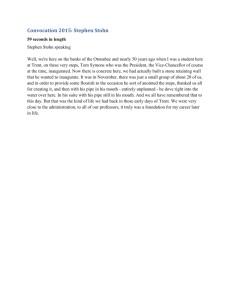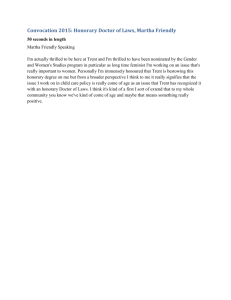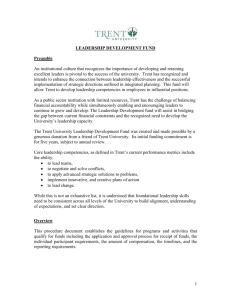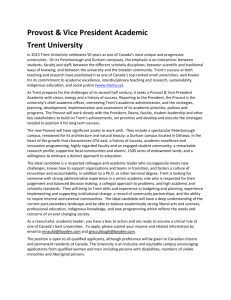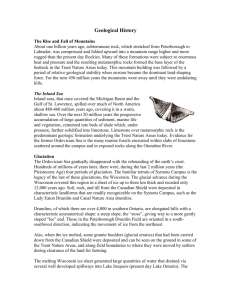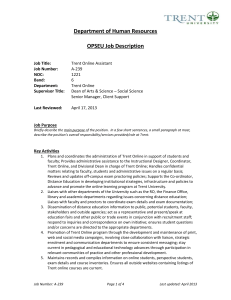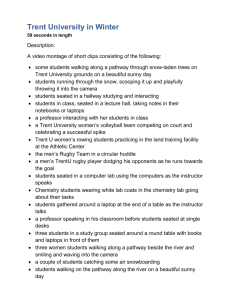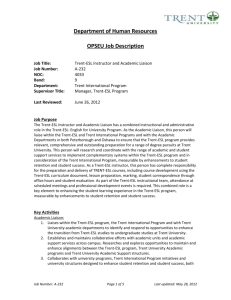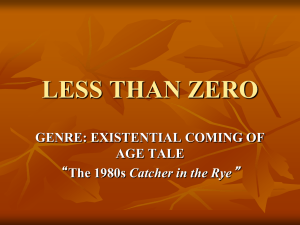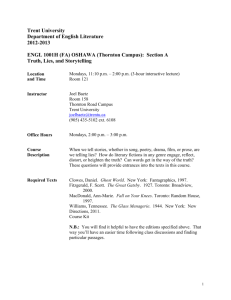transcript - Trent University
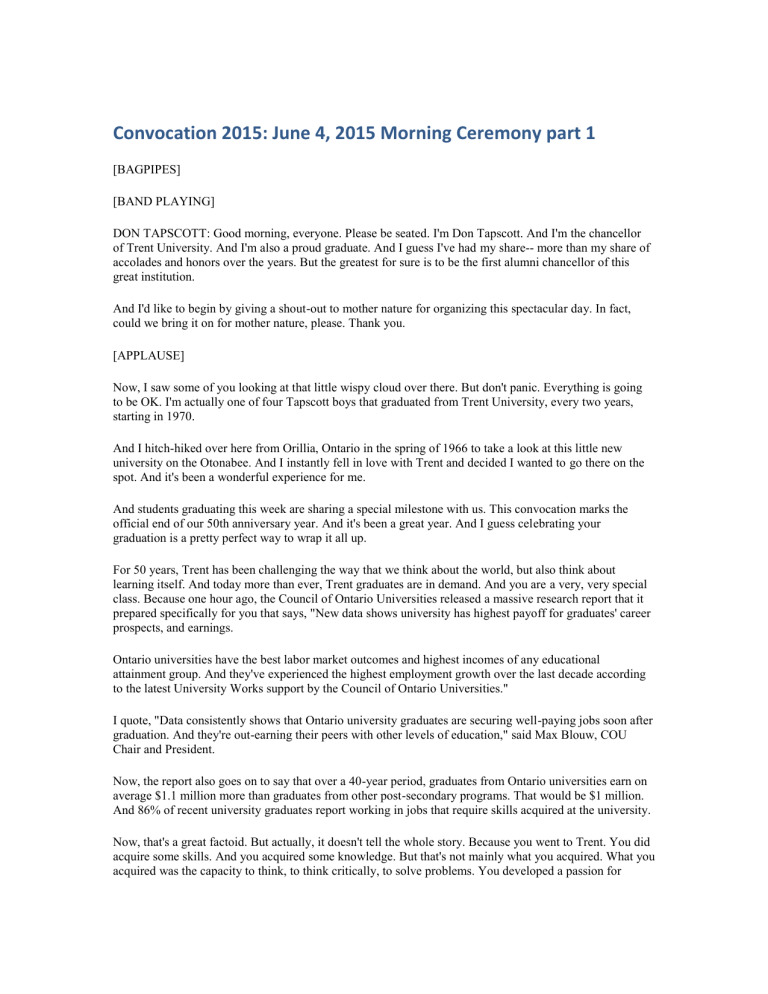
Convocation 2015: June 4, 2015 Morning Ceremony part 1
[BAGPIPES]
[BAND PLAYING]
DON TAPSCOTT: Good morning, everyone. Please be seated. I'm Don Tapscott. And I'm the chancellor of Trent University. And I'm also a proud graduate. And I guess I've had my share-- more than my share of accolades and honors over the years. But the greatest for sure is to be the first alumni chancellor of this great institution.
And I'd like to begin by giving a shout-out to mother nature for organizing this spectacular day. In fact, could we bring it on for mother nature, please. Thank you.
[APPLAUSE]
Now, I saw some of you looking at that little wispy cloud over there. But don't panic. Everything is going to be OK. I'm actually one of four Tapscott boys that graduated from Trent University, every two years, starting in 1970.
And I hitch-hiked over here from Orillia, Ontario in the spring of 1966 to take a look at this little new university on the Otonabee. And I instantly fell in love with Trent and decided I wanted to go there on the spot. And it's been a wonderful experience for me.
And students graduating this week are sharing a special milestone with us. This convocation marks the official end of our 50th anniversary year. And it's been a great year. And I guess celebrating your graduation is a pretty perfect way to wrap it all up.
For 50 years, Trent has been challenging the way that we think about the world, but also think about learning itself. And today more than ever, Trent graduates are in demand. And you are a very, very special class. Because one hour ago, the Council of Ontario Universities released a massive research report that it prepared specifically for you that says, "New data shows university has highest payoff for graduates' career prospects, and earnings.
Ontario universities have the best labor market outcomes and highest incomes of any educational attainment group. And they've experienced the highest employment growth over the last decade according to the latest University Works support by the Council of Ontario Universities."
I quote, "Data consistently shows that Ontario university graduates are securing well-paying jobs soon after graduation. And they're out-earning their peers with other levels of education," said Max Blouw, COU
Chair and President.
Now, the report also goes on to say that over a 40-year period, graduates from Ontario universities earn on average $1.1 million more than graduates from other post-secondary programs. That would be $1 million.
And 86% of recent university graduates report working in jobs that require skills acquired at the university.
Now, that's a great factoid. But actually, it doesn't tell the whole story. Because you went to Trent. You did acquire some skills. And you acquired some knowledge. But that's not mainly what you acquired. What you acquired was the capacity to think, to think critically, to solve problems. You developed a passion for
learning lifelong. Because you'll need to reinvent your knowledge base multiple times as you go throughout life.
You developed capabilities to put things in context, to understand the interrelationship between things. And being at a liberal arts and science university helps you be a better business person, as most of you are graduating with business degrees.
And you will all find work. I know everyone's kind of panicked about it. But it's going to happen. And some of you-- you may not know it today, but you may know it as soon as within the next year-- will become entrepreneurs. And that's a wonderful thing. And I'd like all of you to think about that as an opportunity for you.
Because we need entrepreneurs in Canada as we move from a resource-based economy to an innovation, knowledge economy, where we create value by brain rather than by brawn. And we also need entrepreneurs because of the high levels of unemployment, in particular, youth unemployment. 80% of new jobs come from companies that are five years old or less.
And this is a great time to be an entrepreneur. Because small companies can have all the capabilities of big companies now, without the main liabilities. So consider that as an opportunity. Also, the skills that you acquire-- it's great 80% of recent graduates report working in jobs that relate to those skills.
But you will need to reinvent your knowledge base. Recent studies show up to 7 times you will reinvent your entire knowledge base throughout your life. And that means that your degree is a wonderful thing.
And the skills that you have are a wonderful thing. But they are kind of like a milk carton. They have a time stamp on them. And you need to constantly learn. And some of you will go on. And you'll do additional studies. And that's a wonderful thing, too.
So I know first-hand that-- because it worked for me as a Trent graduate-- that you're uniquely equipped and prepared for the exciting and challenging future that lies ahead. And you're not just prepared for the future. I think that you will shape it.
My view about the future is it's not something to be predicted. It's something to be achieved. And with your
Trent experience, I think you do have the capabilities, you have the tools to take full advantage of the opportunities around you.
So this is your moment. This is your time to imagine, right now, today, at this moment, on this beautiful day-- there's no nicer venue to graduate on planet Earth. And I know that. Because I've been to many convocations.
It's an opportunity for you to reflect, to think about designing your life, not just to achieve happiness and prosperity, which of course you deserve-- and by all means, as Spock said, live long and prosper-- but also to think about creating a life that's purposeful, creating a principled life of consequence. Because the world needs you to build a better world. So heartfelt congratulations to each of you on reaching this important milestone. And I now declare the convocation open.
[APPLAUSE]
LEO GROARKE: Good morning. My name's Leo Groarke. I'm the president vice chancellor of Trent
University. I do want to share with you that this is my first year as President. And this is my first series of convocations at Trent University. I've started to count the number of university convocations I've been at.
And I believe this is number 44.
And I did want to tell you how much I'm enjoying the convocations at Trent University. I'm used to convocations at, I'll just say, other places, where there are 400, 500 students that go across the stage. And you sit there for four hours or five hours. In comparison with that, it's truly a delight to be at convocations at Trent University, which are just the right size.
I would say convocations at Trent University are personal. And that's very much in keeping with what
Trent University itself tries to be. It's a place where we pay attention to individuals and to people. I'm delighted to welcome all our guests today. I'm especially delighted to welcome visitors, visitors from across
Canada and also international visitors.
And one of the things I've been doing this week just for fun is running around and talking to the families that have come from other countries to help us celebrate the successes of their sons and daughters. And I will share with you that so far I've talked to people from Uganda, Australia, Ireland, Lagos, Ecuador,
Nigeria, the Netherlands, the Bahamas, Pakistan, China, and Vietnam. The list grows longer every day.
For those of you who have come internationally, I'm trying to compliment you all for your decision to visit us now, rather than in February. The students know what I'm talking about. Also, while you're here I want to encourage you to walk around the campus and enjoy and appreciate what Peterborough and the coauthors has to offer.
I will say carefully that the best way to appreciate the wonderful environment we have here is to get out in a canoe or a kayak. And actually, last night we had a dinner last night. And I went home afterwards. And I went for a kayak ride, which was quite late at night. And I was going to tell you a story about that. But then it occurred to me that actually, I don't want you going out in a kayak or canoe late at night, especially if you haven't been in a canoe or kayak before.
I did want to let people know that the ceremony today is being broadcast around the world. So for people who can't be here still have an opportunity to see our students in their glory. I have a special guest that I want to introduce. Please join me in welcoming his worship Daryl Bennett, the mayor of Peterborough, who has joined us today.
[APPLAUSE]
As we begin this ceremony, on behalf of the university, I want to acknowledge that we are located in the traditional territory of the Mississauga and Anishinaabe, adjacent to the Haudenosaunee Territory in eastern
Ontario. Especially in a week when Canada's Truth and Reconciliation Commission will present its findings on the regrettable history of the residential school system, It is important to honor and recognize the traditional occupants of this land. And I would say that's something that Trent does very, very well.
I do want to emphasize that the ceremony today is about our students. It's about our graduands. All of us in our lives, we all have good days. We all have bad days. We all have special days. And this is to be a very special day for our graduands. It's our opportunity to celebrate your accomplishments and your successes.
I want you to bask in the glory. I want you to take the time to really enjoy it and appreciate it. And I thank you on behalf of the rest of us for allowing us to bask in your reflected glory. And that's special, too. I would say that as we celebrate our students, we also celebrate their parents, their families their supporters, their friends who helped them achieve the successes that they've achieved.
In each of the convocations, I'm trying to tell our visitors in particular something about Trent University. I'd like you to go away with an appreciation of what a vibrant university this is. One thing I will mention, which the chancellor has already mentioned, is that this is the 50th anniversary of Trent. Trent has arrived.
We're an established university. It's been a wonderful year of celebration and events. I want to remind our graduands in particular that there's another anniversary coming up that they should keep in mind. 50 years
from now will be Trent's 100th anniversary. And I'm expecting you all to be back here to celebrate it. I probably won't make it. But please enjoy it without me.
Second thing I thought I would highlight today-- I want to highlight that Trent is a two-campus university.
Now, for Trent, if you like, Peterborough is the mothership. This is where the university was born and has grown. But this year we also celebrated an anniversary in Oshawa in Durham. And that anniversary was the
40th anniversary of the founding of our Durham campus. And I did want to say that we're better by being a two-campus university than a one-campus university.
Every student that comes to the Durham campus adds something to the Peterborough campus-- I'll say as administrator-- partly to the bottom line. But that's not the only thing that we're interested in. It ties us to the greater Toronto area. It ties us to everything that's happening there. And I would say that these days all sorts of things are happening on the Durham campus. And we need to be proud of having two distinct campuses as Trent University.
I think it's an exciting time for Trent. Our future looks bright. To our graduates, I want to finish by saying please keep in mind that you're still part of the Trent family when you leave. You're just a part of a different component of that family. You're part of our alumni family. And I would say that's a strong component. It's
44,000 people strong. It's an international component. As you strike out in your lives, in your futures, in your successes, please remember us. And please keep in touch.
Now, Mr. Chancellor, I'm pleased to call on Professor Moira Howes, our dean of humanities, to introduce a remarkable individual who we will recognize with an honorary Doctor of Letters degree. Thank you very much.
[APPLAUSE]
MOIRA HOWES: Mr. Chancellor. Stephen Stohn graduated from Trent University in 1969 and returns to
Trent today to receive another degree, our university's highest honor. Since graduating from Trent, Stephen
Stohn has had an incredible career. He is the president of Epitome Pictures and has been executive producer for the Juno Awards, the feature films Me? and The Clown Murders and numerous television shows, including Degrassi-- The Next Generation, Instant Star and Riverdale.
Mr. Stohn is also an entertainment and copyright lawyer and founding partner of one of the leading entertainment law firms in Canada. This, and he is a songwriter, performing artist, and record producer. Mr.
Stohn has an outstanding collection of awards and distinctions for his work, including induction into the
Canadian Music and Broadcast Industry Hall of Fame, 13 Canadian Screen Awards, and a Peabody Award for Distinguished Public Service in Media. He has also been nominated for numerous prestigious awards, including three Primetime Emmy Awards.
I would like to draw your attention, though, and especially the attention of our graduates, to three of the reasons why Stephen Stohn's achievements are so meaningful to us here today. The first concerns his remarkably creative career trajectory. Mr. Stohn sets a wonderful example of just how original and bold you can be in building your life and creating your own unique path. You can write top-40 songs, advocate for change in copyright law, and succeed in business. Mr. Stohn shows that you can mix it up and follow all of your passions.
The second is that you can follow your passions and be a courageous storyteller and communicator. As fans of Degrassi-- The Next Generation will know, the show raises issues that are groundbreaking for television and, for some audiences, controversial. It takes courage to bring such issues into the open so that we can engage them together. And it's very important for us to do so. Mr. Stohn shows that you can be courageous and ethical in your work, and succeed because of it.
The third reason Mr. Stohn's achievements are so meaningful to us at Trent is that he creates lasting connections. While a student at Trent, Mr. Stohn started our student newspaper, The Arthur, and our radio station, Trent Radio, together with Christopher Ward, who's here with us today. Both The Arthur and Trent
Radio continue to foster connection and courageous storytelling in the Trent community today.
Mr. Stohn has also been an outstanding supporter of students, musicians, and artists in Canada throughout his career, including through the creation of numerous cultural industry associations. Stephen Stohn shows that in your work, you can build lasting connections and strengthen your community. Mr. Chancellor, I am honored to present to you for the degree of Doctor of Letters, Honoris Causa, Stephen Stohn.
[APPLAUSE]
[APPLAUSE]
[APPLAUSE]
LEO GROARKE: Congratulations.
STEPHEN STOHN: Thank you.
LEO GROARKE: Congratulations, Dr. Stohn. It's now my privilege to ask you to address convocation. Mr.
Chancellor, Mr. President, Mr. Mayor, members of the graduating class, faculty, family, and friends, I'm told it is traditional in a convocation address for someone like me of advanced years and supposed advanced wisdom to pass along a nugget of inspiration to assist you on the road ahead. And often, this inspiration consists of some variation on the theme, follow your heart, follow your dream.
But I don't actually think that is the best way to go. And let me explain. I was fortunate enough to be a student here at Trent nearly 50 years ago at a time when many of its institutions were still being created. So it was up to a relatively small group of us to found and established the first guiding principles for a series of important extracurricular activities, such as the student government, including the balance between university-wide and individual college governance, the student newspaper, Arthur, Trent Radio, the Folk
Club, and other music and social institutions, while at the same time earning a degree.
As it was for me in the '60s, what I have come to realize is that the degree being conferred upon you today is not just a degree. It is a confirmation of a life and learning experience that is unique. Many other students will be graduating this month from various colleges and universities elsewhere in Canada and around the world. But the degree you are receiving today is unique because Trent University is unique.
Trent embodies, as it has since the early days, a multi-disciplinary approach, what we called back in my day a Renaissance approach to learning. That is the encouragement of different thinking patterns evolving from a variety of different areas of study and of extracurricular activities.
Now, in that former regard, I majored in a combination of philosophy and economics, two disparate fields whose language and thought patterns are in many ways polar opposite, but combined together in the unique
Trent sauce turned out to be an incomparable foundation for a career as a lawyer, an entertainer, and a producer.
Now, as to extracurricular activities, I have been particularly struck by learning of the student center which you and the entire student body have voted to substantially fund, a student center which I understand after extended analysis has just recently received a go-ahead from the Trent Board of Governors.
Your dedication to the student center is not surprising, perhaps. But it is remarkable. It comes, at least in part, from your deep understanding, perhaps subconscious, but a fundamental and visceral understanding,
nonetheless, of the importance of extracurricular and social experiences as part of the special Trent learning approach.
What it means is that what I experienced nearly 50 years ago is alive and well today. The essence of my long ago experience is to my mind absolutely embodied in the plans for your Trent student center. And I applaud you for it. I guess what I'm saying is that whether your studies or other activities here have been diverse or seemingly focused, you have been positively and fundamentally influenced by the Renaissance thinking that is a secret hallmark of this institution, our alma mater, Trent University.
Now, let us return to my promised nugget of wisdom, a nugget which I suggest is particularly appropriate for those like yourself who have spent time embraced in the Trent Renaissance mode of thinking. I said before that the theme of convocation addresses is often a variation on, follow your heart, follow your dream. But my exhortation today is not to follow your dream, but rather to know your dream. Know your dream.
For following a dream which is only partially understood creates obstacles and frustrations. And the unique learning which you have experienced over your months and years here at Trent gives you a special ability to engage in more varied processes of authentic introspection, sometimes parallel, sometimes conflicting processes, to unblock the layers of self-deception to which we are all prone and to discover what your real dream is.
I have no doubt that your real dream is not what you initially thought it might be. For when we ask ourselves why-- what is behind my thinking that I would like to have a certain trait or be free of a certain perceived problem or to engage in a particular lifestyle or career or relationship-- when we ask ourselves why, we start discovering that what we initially thought was a dream is often merely a means to an end.
And it is the end we must discover. It is the end which is the real dream.
I was lucky enough to discover the kernel, the starting seed of my real dream at 4:30 in the afternoon of
September the 7th, 1964. I was attending my very first rock concert and indeed did not really even know what a rock concert was. We were at the old Maple Leaf Gardens in Toronto. And before the main act came on, there were several warm-up acts who played only two or three songs each with the house lights still up.
Back in those days, there weren't the same types of huge sound equipment and different guitars and drums that we are used to now. I remember each group had their own logos on their drum kits, names like Brenda
Holloway, the King Curtis Band, and Cannibal and the Headhunters. They played two or three songs. And then roadies would quickly switch the equipment. And the next warm-up act would race on.
Now, near the end was a group called Sounds Incorporated, who had an international hit at the time. They sang their three songs and then left the stage. But their equipment remained, which sort of made sense, as they were an internationally-known group. So we figured they would come back and do another few songs.
But they didn't come back. And 15 or 20 minutes went by with nothing happening. The crowd was getting more and more restive and started chanting, almost to the point of anger and frustration.
Then all of a sudden, every light in Maple Leaf Gardens went out, total blackness. The entire crowd, of course, screamed in pandemonium. And suddenly a single spotlight shot out onto the Sounds Incorporated drum kit. A roadie raced across the stage and ripped off the front of the drum to reveal a new name, The
Beatles. And the four lads ran out on stage. We heard almost nothing after that with all the screaming that went on.
So it was that afternoon I knew what my dream was, that I was destined to be a rock star. Well, of course, that is what I thought my dream was. Over my years at Trent and beyond, I realized more and more that what I really wanted was to work with talented and creative people, helping projects move forward,
particularly projects that impacted people's lives positively. And as I delved further, I started to realize that for my dream to be worthwhile I'd have to be healthy and have the respect and trust of loved ones.
And I realized how many other aspects of personal, physical, emotional, and career health were vital to what I wanted in life and must become part of the dream. And so it was over time my real dream started to become evident in a very vivid and detailed way. And while my initial dream never did come true, I am happy to say that the real one is very much happening. And indeed part of it is culminating here and now on this very podium.
So I encourage each of you to engage in ongoing self-questioning, to find your dream, and when you think you have found it, to keep asking, why is this my dream? What is behind my thinking this is my dream?
Until at last you truly find your authentic, real dream. And once you know what that dream is, you won't need exhortations to follow it. You'll likely find that you are already a substantial way down the path towards achieving it.
And so that is what I leave you with today. Know your dream. Know your dream, and you will be that much closer to achieving it. In closing, I applauded you earlier for your work on the student center. And I would like to now further applaud and congratulate each of you on your many accomplishments which are being specifically memorialized here today. And in that regard, may I be so bold as to speak as one of and on behalf of all the Trent students who have graduated before you, and in so doing to welcome you into the special ranks known as Trent University alumni.
From all of us, we applaud all of you. We congratulate you. And we wish you every good fortune on your road ahead. Thank you.
[APPLAUSE]
LEO GROARKE: Thank you so much for those words, Dr. Stohn. You may not have become a rock star.
But you have become a star as far as we're concerned. Ladies and gentlemen, we are now going to move to the presentation of students for degrees. And I'd just like to explain briefly what happens.
There's a bit of a square here that the students will follow around. We have a senior academic who will read their name. They will walk across and meet the chancellor. Graduands, that's your moment of fame. Bask in the glory. Take your time there.
You will keep coming in this direction. I'll be here to meet you, as will Tracy Al-idrissi. Tracy Al-idrissi is the registrar of the university, our official record keeper. We will greet you. And then there are faculty and staff here who you might want to say hello to, as well.
Ladies and gentlemen, I'd like to call on Professor Ray Dart, the director of the Business Administration
Program, to present candidates for the Bachelor of Business Administration degree.
RAYMOND DART: We are? There we are. Good morning. We ask that you hold your applause until all the graduates have received their degrees and been congratulated by the registrar, Tracy Al-idrissi. Mr.
Chancellor, I'm pleased to present for the degree of Bachelor of Business Administration candidates whose names will be read, whom the Senate has duly declared worthy of the honor, that they may receive the degree at your hands.
[READING NAMES]
Please join me in congratulating the recipients of the Bachelor of Business Administration degrees.
[APPLAUSE]
Mr. Chancellor, I'm pleased to present for the degree of Bachelor of Arts in the Honours Program candidates whose names will be read, whom the Senate has duly declared worthy of the honor, that they may receive the degree at your hands.
[READING NAMES]
